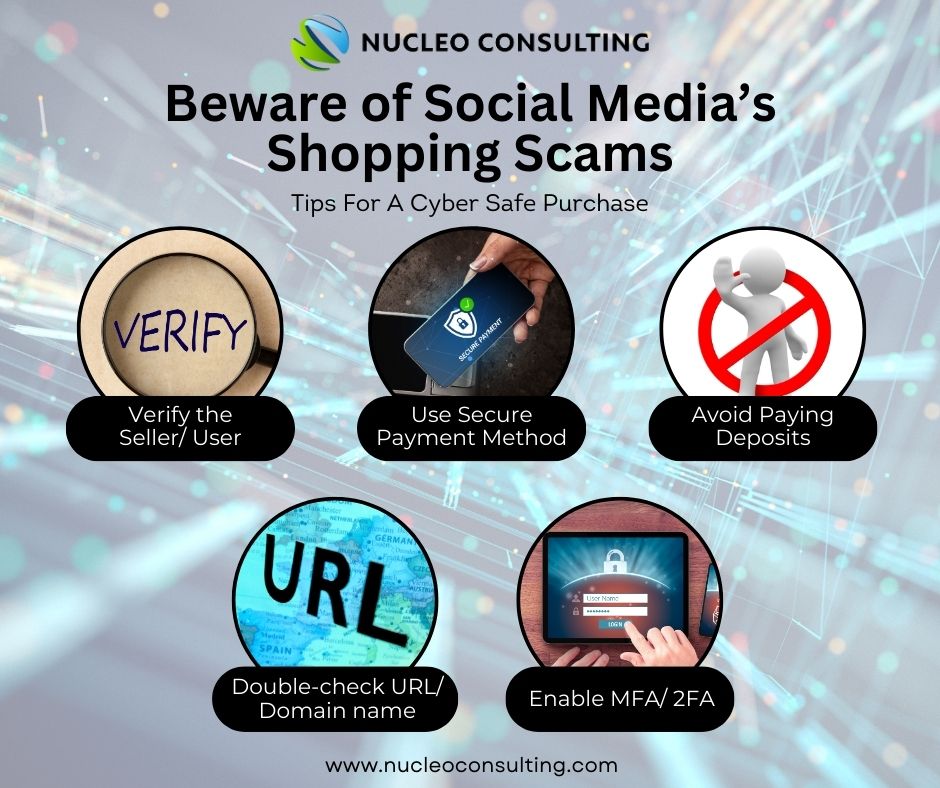[2 mins read]
Online shopping has become an essential part of our lives, offering convenience and accessibility like never before. However, with the rise of e-commerce, a darker side has emerged – scams.
Scammers are increasingly exploiting the vast user base of platforms like Facebook, Instagram, and TikTok to carry out fraudulent activities, leaving unsuspecting consumers at risk of financial loss and identity theft. In this article, we shed light on the most common scam techniques on social media platforms you should look out for when making any purchases.
Fake listings
A common tactic employed by scammers on social media is the creation of fake listings for popular and desirable items. These scammers post attractive images of products at seemingly unbeatable prices, enticing users to purchase. However, once the payment is made, the victims often receive nothing in return. Scammers may also request a deposit to reserve the item before collection. This seemingly legitimate request can trick users into thinking they are securing a genuine deal. Unfortunately, once the deposit is made, the scammer disappears, leaving the buyer without their money or any hope of receiving the promised item.
Deposits for Reservation
Similar to the ‘fake listing’ technique mentioned, another common scenario is where the scammer lists a whole list of used items for sale, and requests a deposit to reserve the item. The price listed would make more sense as the items are labeled as used or pre-loved. Unsuspecting victims, trusting that they have secured a legitimate transaction, will only know that they have fallen into a scam when the scammer cuts off all communication and disappears from the platform. The victims are usually left with no way to retrieve their funds or track down the scammer.
Embedded Phishing URLs
Another common type of scam on social media platforms involves the use of embedded phishing links (URLs). Scammers often create convincing posts or messages that include links to what appear to be reputable websites. These websites are cleverly designed to imitate legitimate online marketplaces, prompting unsuspecting users to click and sign up for an account. The form on the fake websites then collects sensitive information, including names, emails, passwords, addresses, and even banking details. Once the user provides this information, the scammer can use it to commit identity theft, drain the victim’s bank account, or engage in other fraudulent activities.
Protecting Yourself from Social Media Scams

To protect yourself from falling victim to scams such as the ones mentioned, it’s essential to exercise caution and adopt a skeptical mindset when making any purchase online. Here are some tips to stay cyber-safe when making purchases on social media platforms:
- Verify Sellers: Before making any purchase, research the seller’s profile, check for customer reviews, and look for signs that it may be a fake account.
- Use Secure Payment Methods: Stick to reputable payment methods that offer buyer protection, such as credit cards or secure online payment platforms.
- Avoid Deposits: Refrain from making deposits or prepayments for items, especially if the seller insists. Opt for cash-on-delivery or cash-and-carry option whenever possible.
- Double-check URLs: When clicking on links/ URLs, ensure that the website’s URL is legitimate. Be cautious of misspellings or slight variations in the web address.
- Enable Two-Factor Authentication: Adding an extra layer of security to your accounts can help protect your personal information from being compromised. 2FA/MFA should be enabled whenever possible.
While the convenience of online shopping is undeniable, it is crucial to remain vigilant against the rising threat of social media scams. By staying informed, practicing due diligence, and adopting safe online habits, consumers can protect themselves from falling prey to these cyber threats. As technology evolves, so must our awareness and commitment to securing our online transactions and personal information.
IT Tips | Scams | Cybersecurity | Social Media | Phishing | Online Shopping